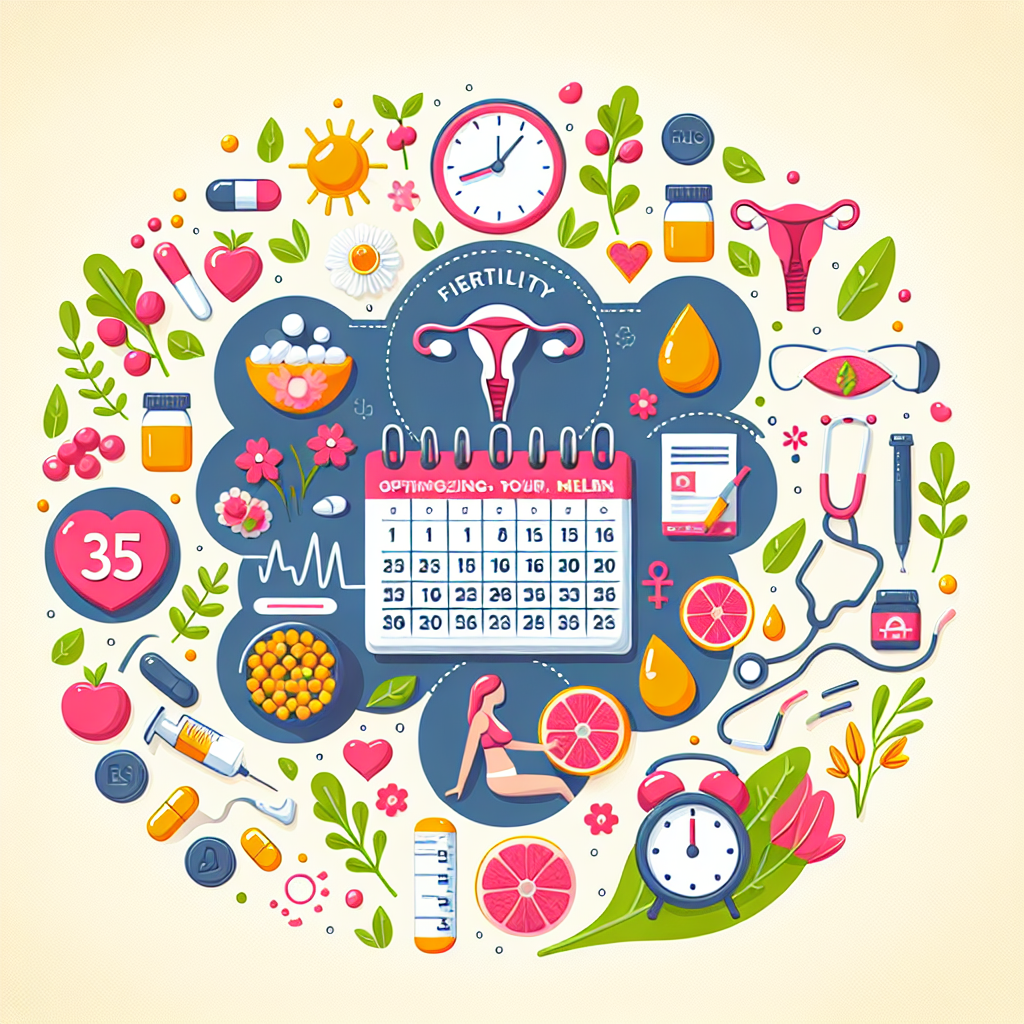Fertility Optimization for Women Over 35

“Are you a woman over 35 looking to optimize your fertility? Don’t wait any longer. Visit our website and discover the best strategies and treatments for fertility optimization. Start your journey towards vibrant vitality today!“
Understanding the Role of Nutrition in Fertility Optimization for Women Over 35
Fertility optimization for women over 35 is a topic of great interest and importance. As women age, their fertility naturally declines, making conception more challenging. However, it’s important to note that age is not the only factor that influences fertility. Lifestyle choices, including nutrition, play a significant role in fertility optimization. Understanding the role of nutrition in fertility optimization for women over 35 can provide valuable insights for those seeking to conceive.
The connection between nutrition and fertility is well-established. A balanced diet not only supports overall health but also enhances reproductive health. It provides the necessary nutrients for hormonal balance, egg health, and a healthy reproductive system. Therefore, optimizing nutrition is a practical and effective strategy for enhancing fertility in women over 35.
Firstly, let’s consider the role of macronutrients. Proteins, carbohydrates, and fats are essential for hormone production and balance. Hormones, in turn, regulate the menstrual cycle and ovulation, which are critical for conception. Consuming a balanced diet rich in lean proteins, complex carbohydrates, and healthy fats can support hormone health and thus, fertility.
Moreover, certain micronutrients are particularly important for fertility. For instance, folic acid, a type of B vitamin, is crucial for preventing neural tube defects in the early stages of pregnancy. Therefore, women trying to conceive are often advised to take a folic acid supplement. Other essential micronutrients for fertility include zinc, which supports ovulation and fertility in women, and selenium, which helps protect the eggs and embryos from damage.
In addition to these nutrients, antioxidants play a vital role in fertility. They help to combat oxidative stress, which can damage both the eggs and sperm. Foods rich in antioxidants, such as fruits and vegetables, can therefore support fertility.
However, it’s not just about what you eat, but also about what you avoid. Certain foods and substances can negatively impact fertility. For example, excessive caffeine and alcohol can interfere with the hormonal balance and affect fertility. Similarly, a diet high in processed foods and trans fats can negatively impact ovulation and overall reproductive health.
It’s also worth noting that maintaining a healthy weight is crucial for fertility. Both underweight and overweight conditions can interfere with regular menstrual cycles and ovulation, making conception more difficult. A balanced diet, combined with regular physical activity, can help maintain a healthy weight and thus, support fertility.
In conclusion, nutrition plays a pivotal role in fertility optimization for women over 35. A balanced diet rich in essential nutrients, combined with a healthy lifestyle, can significantly enhance fertility. However, it’s important to remember that every woman is unique, and what works for one may not work for another. Therefore, it’s advisable to consult with a healthcare provider or a nutritionist to develop a personalized nutrition plan that suits your individual needs and supports your fertility journey.
Exploring the Impact of Lifestyle Changes on Fertility for Women Above 35

Fertility optimization for women over 35 is a topic of great interest and importance. As more women are choosing to delay childbearing for various reasons such as career advancement, educational pursuits, or finding the right partner, understanding the impact of lifestyle changes on fertility becomes crucial.
The biological clock is a reality that women cannot ignore. Fertility naturally declines as women age, with a significant drop after the age of 35. However, this does not mean that conception is impossible, but it may require more planning and preparation. One of the most effective ways to enhance fertility is through lifestyle modifications.
Diet plays a pivotal role in fertility. A balanced diet rich in fruits, vegetables, lean proteins, and whole grains can improve fertility by promoting regular ovulation and improving egg quality. Conversely, a diet high in processed foods, sugars, and unhealthy fats can negatively impact fertility. Therefore, women over 35 who are trying to conceive should focus on maintaining a healthy diet.
Physical activity is another key factor in fertility optimization. Regular exercise can help maintain a healthy weight, which is essential for fertility. Obesity can lead to hormonal imbalances that can interfere with ovulation and reduce fertility. However, it’s important to note that excessive exercise can also negatively impact fertility by disrupting menstrual cycles. Therefore, a balanced approach to physical activity is recommended.
Stress management is also crucial for fertility. High levels of stress can disrupt the hormonal balance necessary for ovulation and conception. Therefore, incorporating stress management techniques such as yoga, meditation, or mindfulness into daily routines can be beneficial for women over 35 trying to conceive.
Sleep is another often overlooked but important factor in fertility. Lack of sleep can lead to hormonal imbalances that can affect fertility. Therefore, ensuring adequate sleep is essential for women trying to conceive.
Alcohol and tobacco use can also significantly impact fertility. Both can lead to decreased fertility and increased risk of miscarriage. Therefore, women over 35 who are trying to conceive should consider reducing or eliminating their consumption of alcohol and tobacco.
Lastly, regular health check-ups are essential for women over 35 who are trying to conceive. Regular check-ups can help identify any potential health issues that could impact fertility and allow for early intervention.
In conclusion, while age is a significant factor in fertility, it is not the only one. Lifestyle changes can significantly impact fertility, especially for women over 35. By maintaining a healthy diet, engaging in regular physical activity, managing stress, ensuring adequate sleep, reducing alcohol and tobacco use, and having regular health check-ups, women over 35 can optimize their fertility and increase their chances of conception. However, it’s important to remember that every woman is unique, and what works for one may not work for another. Therefore, it’s always best to consult with a healthcare provider when planning for pregnancy.
The Importance of Regular Health Check-ups for Fertility Optimization in Women Over 35
Fertility optimization for women over 35 is a topic of great importance, especially in today’s society where many women are choosing to start their families later in life. One of the key aspects of fertility optimization is regular health check-ups, which play a crucial role in ensuring a woman’s reproductive health is at its best.
To begin with, regular health check-ups provide an opportunity for early detection of any potential fertility issues. As women age, the quality and quantity of their eggs decline, which can lead to difficulties in conceiving. Regular health check-ups can help identify any changes in the reproductive system that may affect fertility, such as the presence of fibroids or polyps in the uterus, endometriosis, or hormonal imbalances. Early detection of these issues allows for timely intervention, which can significantly improve a woman’s chances of conceiving.
Moreover, regular health check-ups can also help monitor and manage other health conditions that may indirectly affect fertility. For instance, conditions like diabetes, thyroid disorders, and high blood pressure can impact a woman’s fertility if not properly managed. Regular health check-ups ensure these conditions are kept under control, thereby reducing their potential impact on fertility.
In addition to detecting and managing potential fertility issues and other health conditions, regular health check-ups also provide an opportunity for women to discuss their reproductive health with their healthcare provider. This can be particularly beneficial for women over 35 who may have concerns or questions about their fertility. Healthcare providers can provide valuable advice and guidance on lifestyle changes that can help optimize fertility, such as maintaining a healthy weight, eating a balanced diet, getting regular exercise, and avoiding harmful substances like tobacco and alcohol.
Furthermore, regular health check-ups can also help women over 35 understand their fertility window better. The fertility window, or the time in a woman’s menstrual cycle when she is most likely to conceive, tends to shorten as women age. Regular health check-ups can help monitor a woman’s menstrual cycle and identify her fertility window, thereby increasing her chances of successful conception.
Lastly, regular health check-ups can also provide emotional support for women over 35 who are trying to conceive. The process of trying to conceive can be emotionally challenging, particularly for women over 35 who may be facing additional challenges due to age-related decline in fertility. Regular interactions with healthcare providers can provide much-needed emotional support and reassurance during this time.
In conclusion, regular health check-ups are of paramount importance for fertility optimization in women over 35. They provide an opportunity for early detection and management of potential fertility issues and other health conditions, offer a platform for discussion and advice on reproductive health, help identify the fertility window, and provide emotional support. Therefore, women over 35 who are trying to conceive should make regular health check-ups a priority in their journey towards motherhood.